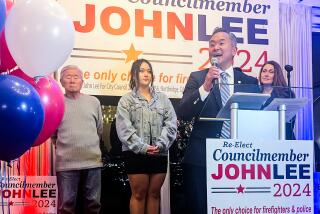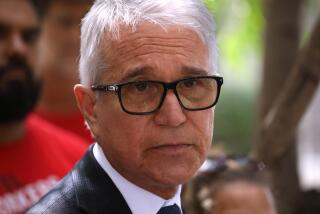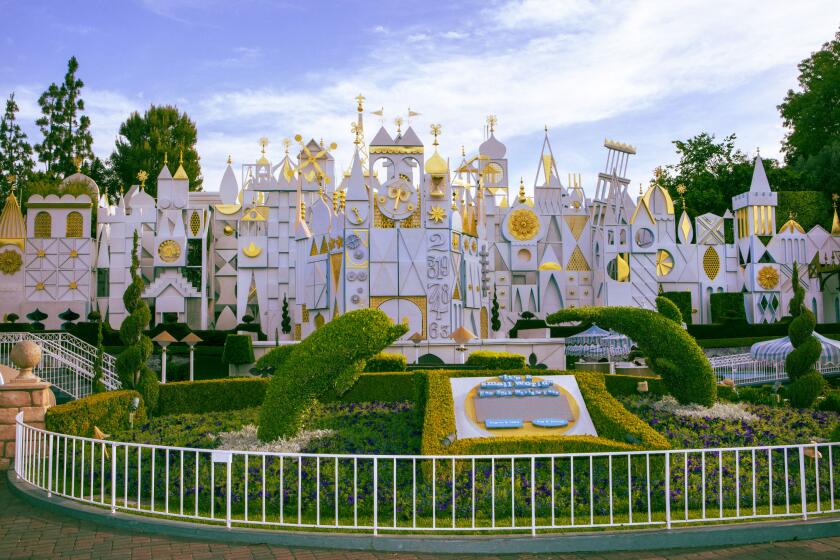Mayoral debate focuses on city’s troubled finances
- Share via
In the highest-profile debate so far in the Los Angeles mayoral race, three longtime city officials defended their records Monday night as two long-shot challengers accused them of putting the city on a path to insolvency.
The city’s chronic budget shortfalls dominated the event at UCLA’s Royce Hall, televised live on KNBC-TV Channel 4. Entertainment lawyer Kevin James and technology executive Emanuel Pleitez sought to maximize the free media exposure, portraying themselves as fresh alternatives to business as usual at City Hall.
James, a former radio talk-show host, described himself as an independent and accused rivals Wendy Greuel, Eric Garcetti and Jan Perry — all veteran elected officials — of being cozy with unions representing the city workforce.
“Bankruptcy doesn’t happen overnight,” said James, the only Republican in the race. “This happened over a period of time and it happened because of a series of bad decisions.”
Pleitez struck a similar note.
“Our politicians in the last decade made decisions on numbers they didn’t understand,” he said.
“I’m the only one that has worked in the private sector and on fiscal and economic policies at the highest levels,” Pleitez said, citing his experience as a special assistant to economist Paul Volcker on President Obama’s Economic Recovery Advisory Board.
Greuel, Garcetti and Perry, in turn, pledged to show fiscal restraint as the city grapples with projected budget shortfalls totaling more than $1 billion over the next four years.
City Controller Greuel cited the “waste, fraud and abuse” her office’s audits have identified at City Hall, saying they demonstrate her independence.
“As mayor of Los Angeles, I get not only being the fiscal watchdog, and showing where we can find this money, and knowing where the bodies are buried,” said Greuel, who served on the City Council for seven years. “I’ve learned as city controller, you don’t always make friends when you highlight what can be done better.”
Garcetti, a councilman for more than a decade, said he had a record of “not just talking about pension reform, but delivering on it.” When tax collections dried up in the recession, he said, the council and mayor eliminated 5,000 jobs and negotiated a deal with unions requiring some city workers to contribute to their health and pension benefits.
“Those are the things that kept us away from our own fiscal cliff,” he said.
Perry also stressed her support for increasing worker contributions to health and retirement benefits.
“This is about long-term survival,” she said.
By the normal standards of election campaigns, it was a remarkably genteel debate, at least among the three city officials.
Only Perry attacked her rivals, and even then, not by name.
Recalling her work with Garcetti and Greuel in talks with city unions, she faulted them for engaging in “side meetings and side negotiations,” saying she was more transparent.
“As mayor, I will make sure that practice stops, that everything is done on the record — that all employees are treated fairly and all employees are given the same information,” Perry said.
Neither Greuel nor Garcetti answered the attack.
As in previous forums, the most obvious contrasts among the candidates Monday night were in biography and style — rather than policy positions.
All five of the candidates said they believed the mayor should continue to be involved in the Los Angeles Unified School District. Perry said she would not be comfortable pushing a slate of school board candidates, as Mayor Antonio Villaraigosa did in the past.
James said he would favor creating a diploma for students focusing on trades — electricians, plumbers and others. Greuel touted her work as a member of Mayor Tom Bradley’s staff and helping create the L.A.’s Best after-school program. The city could help the public schools with more such programs, she said.
Garcetti said he would create a summer jobs program for teenagers and that he had already used funds for his City Council district to help improve libraries, ball fields and other facilities at public schools.
They largely agreed on some of the thorniest transportation issues facing the city.
All of the contenders, for example, said they would support the creation of a rail stop on the Crenshaw line at Leimert Park, a historical enclave of black culture and arts in South Los Angeles.
With tens of thousands of potential viewers, the hourlong televised debate was the biggest opportunity yet to reach potential voters in an off-year mayoral campaign in which a good-sized audience at many previous debates has been a few hundred.
The debate came a week before voters start casting ballots by mail in the nonpartisan March 5 primary.
If no one wins more than 50%, the candidates who finish first and second will compete in a May 21 runoff.
Times staff writer James Rainey contributed to this report.
More to Read
Sign up for Essential California
The most important California stories and recommendations in your inbox every morning.
You may occasionally receive promotional content from the Los Angeles Times.












